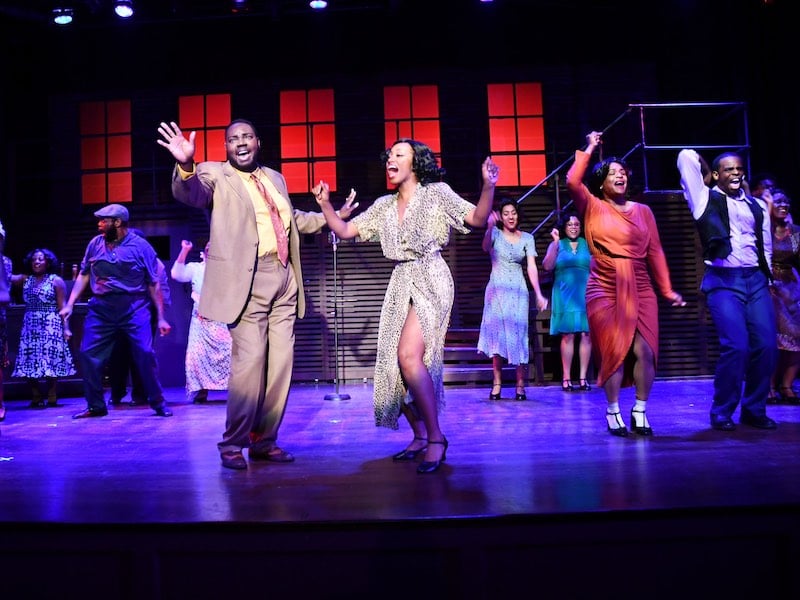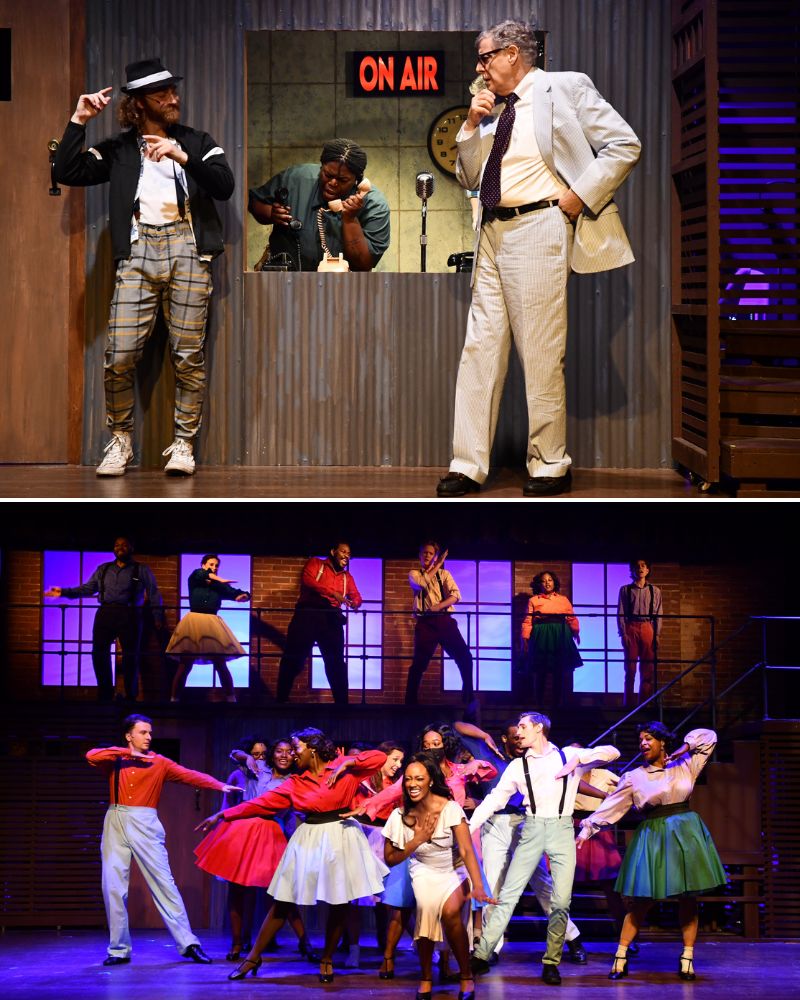There may be no theater better suited to tackle as moving yet racially charged a musical as Memphis (book and lyrics by Joe DiPietro, music and lyrics by David Bryan) than one that has lived through the era the show depicts. The Little Theatre of Alexandria, announcing its 90th anniversary (1934–2024), likely experienced a level of segregation similar to that of 1950s Memphis, Tennessee. However, under the direction of Rikki Howie Lacewell, this somber yet hopeful production, combined with the theater’s historical context, reminds us of how far we’ve come in music and theater arts.
The musical, which won four Tony Awards in 2010, goes beyond merely depicting a historically accurate time period; it is based on the true-life events of DJ Dewey Phillips, who believed that music—like everything else in life—transcends race. In the musical, Huey Calhoun represents Phillips, a disc jockey determined to desegregate the airwaves. He falls in love not only with what the book refers to as “nigger music” but also with a Black woman, which was illegal at the time. Despite the personal costs, he remains steadfast in his convictions.

Xander Conte delivers a commendable performance as Huey Calhoun. Conte’s portrayal of the Southern white boy, complete with plaid pants and a mister hat, is so convincingly authentic that it initially raises doubts about whether his character can genuinely challenge the status quo. However, Conte’s compelling words and actions dispel these doubts. His duet with Khanner Hancock (playing Felicia Farrell, from July 20 to 28, with exceptional class and style) in “The Music of My Soul” (Huey, Felicia, and Company) effectively emphasizes key moments, delivering a performance that is both impactful and chilling.
Other notable numbers include “Make Me Stronger” (Huey, Mama, Felicia, and Company). The ensemble’s appearance in yellow and blue choir robes (costume design by Farrel Hartigan and wardrobe by Robin Worthington) is visually striking. Nikki Arbiter-Murphy’s portrayal of Mama Gladys Calhoun, participating in “race music” despite her initial resistance, is powerful, illustrating how music and lyrics transcend racial boundaries. However, increasing the microphone volume for her performance in this number, as well as in “Change Don’t Come Easy” (Mama, Delray, Gator, and Bobby), would enhance the overall effect.
Otega Okurume, as the suspicious and protective older brother Delray, sings with considerable passion in “She’s My Sister” (Delray and Huey), urging Huey to protect Felicia. A particularly poignant moment occurs shortly after when Felicia is brutally beaten for being with Huey. Her face, covered in blood and bruises (thanks to the exceptional work of makeup designers Kadira Coley and Larissa Norris), fuels her brother’s readiness to confront Huey. In a powerful moment, Kemuel Van Der Puije, playing Gator, commands the theater’s attention with his first line of the night—a single, commanding word: “Stop!” He then sings “Say a Prayer” for racial change and tolerance (Gator and Company) with a solemnity and emotional depth that profoundly resonate with the audience.

Properties designer Geoffrey Baskir effectively incorporates historical elements into the musical with giant front pages in “Radio” (Huey and Company). The pages not only depict Huey’s growing popularity but hint at the real-life DJ Dewey Phillips, who “brought Black music to 100,000 listeners throughout segregated Memphis.” While the Memphis Band performs admirably, some numbers sounded slightly off compared to the original Broadway cast recording, though the reasons for this discrepancy are not immediately clear/for reasons my untrained ears cannot pinpoint.
Overall, this production by the Little Theatre of Alexandria is both beautiful and exceptional. I hope that director Rikki Howie Lacewell continues to bring stories to our local stage that challenge conventions and “change the paradigm as far as what people are accustomed to seeing.”
Running Time: Two Hours 30 minutes including a 15-minute intermission.
Memphis plays through August 10, 2024, at The Little Theatre of Alexandria, 600 Wolfe Street, Alexandria, VA. To purchase tickets ($36 + $3 fees), go online or contact the Box Office via phone (703-683-0496) or email (boxoffice@thelittletheatre.com).
The program for Memphis is online here.
COVID Safety: Face masks are optional.



